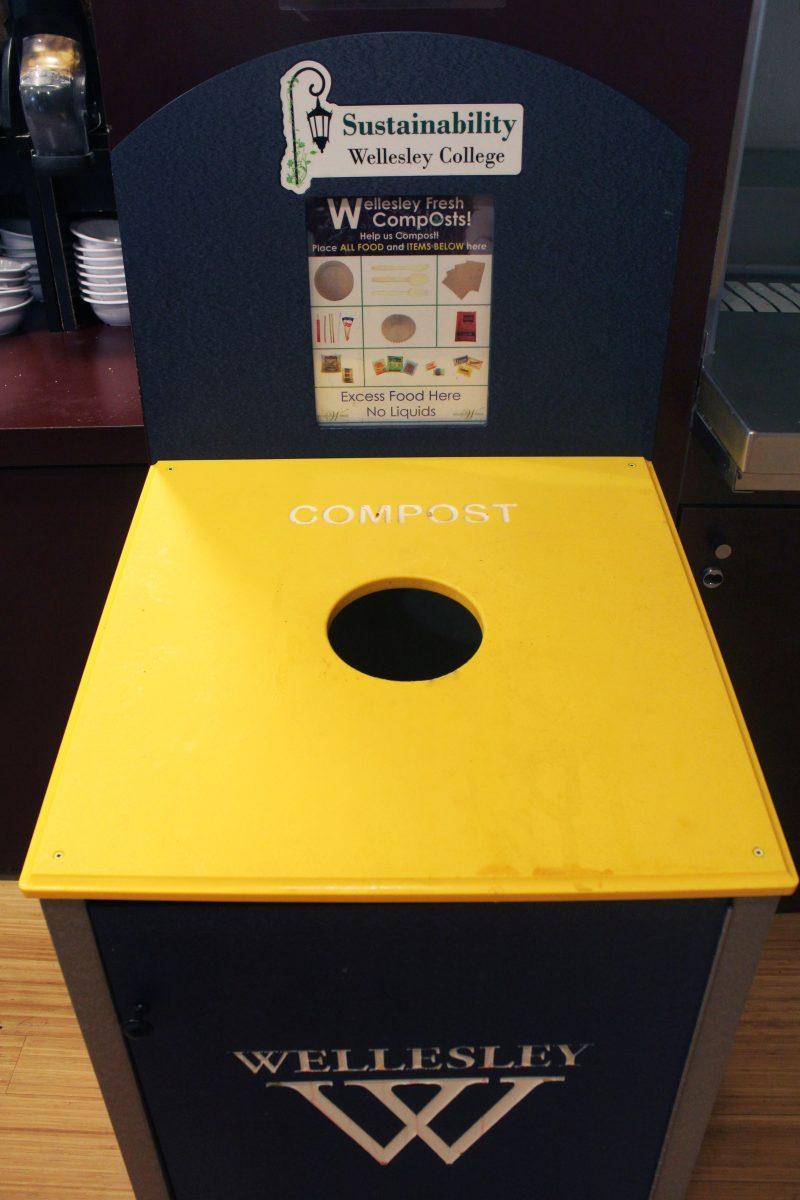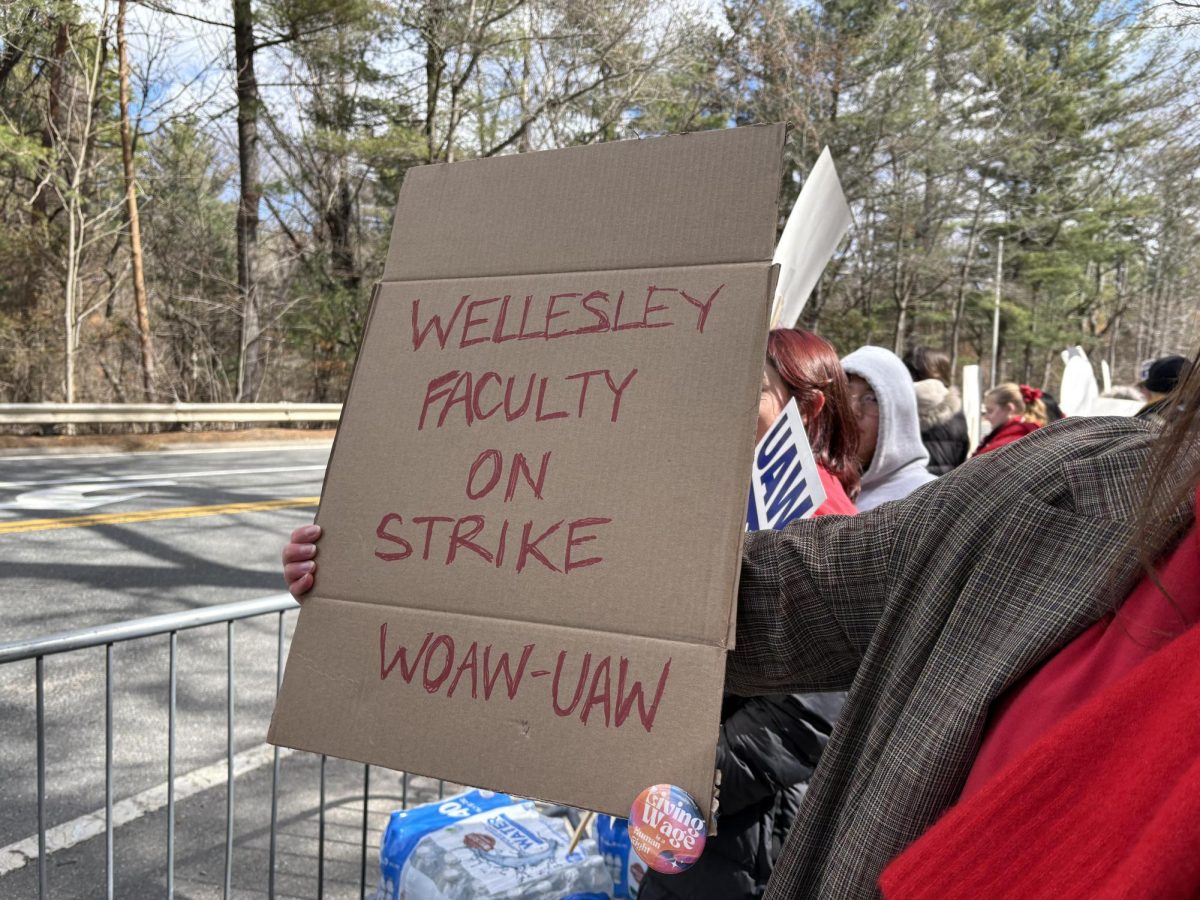College remains in compliance with law
A new composting law in Massachusetts took effect as of Oct. 1 to control the disposal of organic waste. According to the law, businesses that generate one ton or more of food waste a week are required to dispose of it by hauling it to energy-generating plants, composting facilities or farms to be sold as animal feed.
The ban is part of the Massachusetts Department of Environmental Protection’s (DEP) long-term goal to reduce waste disposed of in landfills by 30 percent by 2020. Although the law just took effect last Wednesday, Wellesley College has been running a compost program since last year when the DEP first publicized the law.
“We wanted to get ahead of the game so we didn’t have to sit there and panic and try to do something very quick to comply to these regulations,” Director of Sustainability Patrick Willoughby said.
Wellesley College began composting at Bates dining hall a year and a half ago at the pre-consumer side or in the dining hall kitchen. All of the extra food and scraps collected during preparation were composted. After Wintersession 2013, the College started a post-consumer composting program.
At first, the Office of Sustainability found it difficult to regulate since students were new to sorting out the compost. However, students soon adapted to the changes since most items in the dining halls are compostable. Examples of items that cannot be composted include plastic cutlery, napkins, ice cream cone wrappers, straw wrappers, sugar and tea packets.
“We are not backyard composting. Instead, we are composting on a relatively large scale, which is very different than composting, say in your backyard,” Willoughby said.
According to the law, large institutions have the option of selling their organic waste as animal feed, but this is not an option for the College due to the napkins and plastic cutlery in the compost. Instead, Wellesley’s compost is taken to WeCare Environmental, which is responsible for helping organizations and companies in northeastern United States manage their non-hazardous residual waste. All of the College’s non-compostable trash is taken elsewhere.
“All our trash goes to a waste-to-electricity generation plant which is better than being landfilled. But food waste is a horrible fuel because of its water content,” Willoughby said.
The College has also been composting all of its yard waste onsite for the past 15 years, which eliminates the need to buy mulch or loam except when needed in large-scale projects.
Wellesley College was the only college in the area that worked closely with the DEP and the Massachusetts Board of Health, which helped the College implement the changes.
“We spent a lot of time talking and working through the program with them, and I will give them a lot of credit. They were innovative and willing to look at different methods of doing this,” Willoughby said.
The disposal of compost is expensive but still cheaper than the trash hauling, which can be up to $90 per ton. Since 25 percent of trash taken to landfills is organic, composting saves space, which is already limited in Massachusetts. At Wellesley, the compost program is currently cost-neutral. This is partly due to the fact that the College requires two companies for hauling — one for trash and one for compost.
“It was always my goal to make it cost neutral because I never really thought we could make it cost positive,” Willoughby said.
Last year, the Office of Sustainability had a goal of expanding its composting program campus-wide by summer 2014, and the office met its goals. As of spring semester of last year, the program has been running both pre-consumer and post-consumer compost at all five dining halls. Many students are impressed by Wellesley’s implementation.
“I’m proud of Wellesley for composting because it is a lot more difficult to do when the infrastructure isn’t implemented in the city,” Heidi Wade ’16 said.
Even though the Office of Sustainability has a composting program, it also has plans to reduce food waste overall because 30 to 50 percent of food does not make it to the table.
“It’s about getting students to take food when they are confident they are going to eat it,” said Sharon Bort, sustainability coordinator at Wellesley College.
The Office of Sustainability has already implemented a policy of not having trays in four of the five dining halls in order to help to control the amount of food taken by each student. Without trays, students can only take what they can carry. At the same time, dining hall staff needs to accurately prepare the right amount of food, which can be difficult.
October is sustainability month at Wellesley and across the U.S. The Office of Sustainability is urging students to get involved and share their ideas to make campus a greener place. It also has a class of ‘57 Green Fund, which sets aside half a million dollars for any reasonable sustainability project. Students who want to get involved should contact the Office of Sustainability to pitch their ideas.
The Green Fund is revolving, so all the money saved through the implementation of sustainability projects is re-circulated back into the fund. The fund is managed by nine committee members who work to initiate on-campus sustainability projects. Sustainability projects were set to begin in the summer of 2013 and a number of goals have already been completed, including replacing fluorescent light bulbs with LED lights in Dower and the College grounds.
In terms of sustainability, the campus is also working on other projects including keeping the bike share program running, distributing reusable water bottles to all first years, replacing light bulbs with LEDs and placing eco-representatives in all the residence halls.
“Behavior changes are something hard to do, but we have an eco rep coordinator and hopefully will get eco reps in the dorms to help work towards behavior change,” Bort said.






